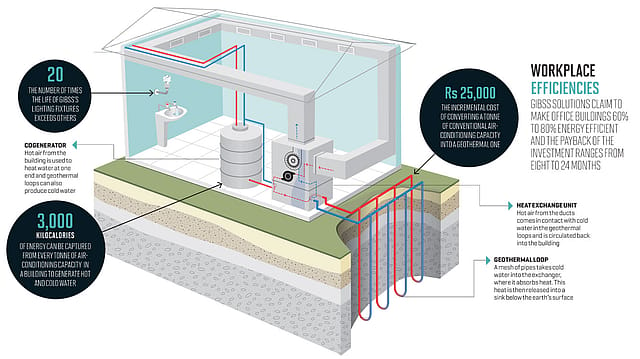Miracle underneath
ADVERTISEMENT

Air-conditioning units of large offices are almost always on the terrace of the building. Unless the office has called in GIBSS (Green India Building Systems and Services) to help it reduce power bills—and gain green points. If GIBSS is in the picture, you can be sure that the cooling units are all safely tucked away underground. It looks neater, and the terrace is free of the noisy, heat-emitting monsters, but that’s not why GIBSS buries the cooling units. It uses the coolness of the earth (geothermal cooling) to reduce the air temperature circulating in office buildings. Its core principle is making office buildings green through zero net energy usage. According to its founders—35-year-old Arun Shenoy and 39-year-old Mandhar Kaprekar—the solutions optimise energy saving and pare operational costs by almost 60%.
In most cases, GIBSS’s solutions (it’s the only outfit in India offering these kind of solutions) add to the savings from reduced energy consumption through LED and five star-rated appliances that buildings usually use. “In a building, 80% of the energy consumed is due to air-conditioning, lighting, and hot water. We work to reduce the consumption of each by 60% to 80%,” says Shenoy. Kaprekar adds that making changes in equipment design (using principles of geothermal energy) and the way they are installed make the difference.
Geothermal cooling has been in existence for 40 years and has over 6 million installations globally. The problems here though were the commercial viability, the late arrival of air-conditioners, the dearth of engineers who could innovate, and the unwillingness to invest that extra rupee in efficiency improvement. “India was resistant to change, but we were looking to be disruptive,” says Shenoy.
January 2026
Netflix, which has been in India for a decade, has successfully struck a balance between high-class premium content and pricing that attracts a range of customers. Find out how the U.S. streaming giant evolved in India, plus an exclusive interview with CEO Ted Sarandos. Also read about the Best Investments for 2026, and how rising growth and easing inflation will come in handy for finance minister Nirmala Sitharaman as she prepares Budget 2026.
“We had to convince people that there were solutions that could reduce the dependence on grid power,” adds Kaprekar. To woo customers, GIBSS not only offered a performance-based revenue model, but also arranged for project financing. It even has a model where clients pay for the project from the savings they incur due to the installed solutions.
The company also offers clean, indoor air quality solutions by controlling humidity, temperature, and ventilation in workspaces.
It even redesigns lighting by using LEDs and other light sources to provide brighter output but with lower power consumption; the life of these light sources is 20 times more than the equipment available in the market. Currently, these lighting solutions are made in Singapore, but production is expected to shift to Thane, near Mumbai, soon.
With four design patents in hand and another eight being readied to be filed this year, GIBSS’s clients include Shell, The Leela Palace Hotels, Four Seasons, Marriott, the French Consulate in Delhi, ISB Mohali, and real estate developers.
GIBSS has grown 600% since its beginning with an investment of Rs 60 lakh in 2008. It plans to grow to Rs 350 crore by the end of FY16. TiE-ISB and Hyderabad Angels are among its early investors. As the business expands, GIBSS plans to raise Rs 25 crore to Rs 30 crore from venture funds in the next few years.
Till then, it’s focussed on beefing up its portfolio. Currently it has 20 projects, of which three are ready and seven nearing completion. Till now, the project size has ranged from Rs 50 lakh to Rs 8 crore, but Kaprekar and Shenoy expect the upper range to grow exponentially.
